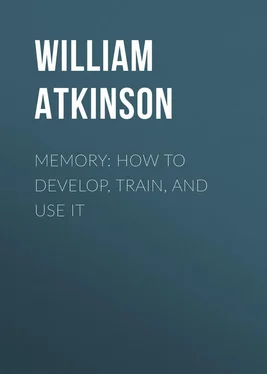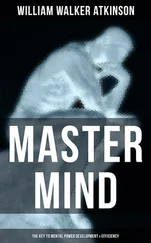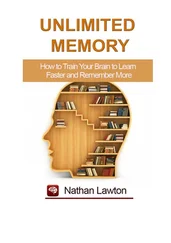William Atkinson - Memory - How to Develop, Train, and Use It
Здесь есть возможность читать онлайн «William Atkinson - Memory - How to Develop, Train, and Use It» — ознакомительный отрывок электронной книги совершенно бесплатно, а после прочтения отрывка купить полную версию. В некоторых случаях можно слушать аудио, скачать через торрент в формате fb2 и присутствует краткое содержание. ISBN: , Жанр: foreign_antique, foreign_prose, на английском языке. Описание произведения, (предисловие) а так же отзывы посетителей доступны на портале библиотеки ЛибКат.
- Название:Memory: How to Develop, Train, and Use It
- Автор:
- Жанр:
- Год:неизвестен
- ISBN:http://www.gutenberg.org/ebooks/41478
- Рейтинг книги:5 / 5. Голосов: 1
-
Избранное:Добавить в избранное
- Отзывы:
-
Ваша оценка:
- 100
- 1
- 2
- 3
- 4
- 5
Memory: How to Develop, Train, and Use It: краткое содержание, описание и аннотация
Предлагаем к чтению аннотацию, описание, краткое содержание или предисловие (зависит от того, что написал сам автор книги «Memory: How to Develop, Train, and Use It»). Если вы не нашли необходимую информацию о книге — напишите в комментариях, мы постараемся отыскать её.
Memory: How to Develop, Train, and Use It — читать онлайн ознакомительный отрывок
Ниже представлен текст книги, разбитый по страницам. Система сохранения места последней прочитанной страницы, позволяет с удобством читать онлайн бесплатно книгу «Memory: How to Develop, Train, and Use It», без необходимости каждый раз заново искать на чём Вы остановились. Поставьте закладку, и сможете в любой момент перейти на страницу, на которой закончили чтение.
Интервал:
Закладка:
The student is urged to pay attention to what we have to say in other chapters of the book upon the subjects of attention and association. It is not necessary to state here the particulars that we mention there. The cultivation of the attention is a prerequisite for good memory, and deficiency in this respect means deficiency not only in the field of memory but also in the general field of mental work. In all branches of The New Psychology there is found a constant repetition of the injunction to cultivate the faculty of attention and concentration. Halleck says: "Haziness of perception lies at the root of many a bad memory. If perception is definite, the first step has been taken toward insuring a good memory. If the first impression is vivid, its effect upon the brain cells is more lasting. All persons ought to practice their visualizing power. This will react upon perception and make it more definite. Visualizing will also form a brain habit of remembering things pictorially, and hence more exactly."
The subject of association must also receive its proper share of attention, for it is by means of association that the stored away records of the memory may be recovered or re-collected. As Blackie says: "Nothing helps the mind so much as order and classification. Classes are few, individuals many: to know the class well is to know what is most essential in the character of the individual, and what burdens the memory least to retain." And as Halleck says regarding the subject of association by relation: "Whenever we can discover any relation between facts, it is far easier to remember them. The intelligent law of memory may be summed up in these words: Endeavor to link by some thought relation each new mental acquisition to an old one. Bind new facts to other facts by relations of similarity, cause and effect, whole and part, or by any logical relation, and we shall find that when an idea occurs to us, a host of related ideas will flow into the mind. If we wish to prepare a speech or write an article on any subject, pertinent illustrations will suggest themselves. The person whose memory is merely contiguous will wonder how we think of them."
In your study for the cultivation of the memory, along the lines laid down in this book, you have read the first chapter thereof and have informed yourself thoroughly regarding the importance of the memory to the individual, and what a large part it plays in the entire work of the mind. Now carefully read the third chapter and acquaint yourself with the possibilities in the direction of cultivating the memory to a high degree, as evidenced by the instances related of the extreme case of development noted therein. Then study the chapter on memory systems, and realize that the only true method is the natural method, which requires work, patience and practice – then make up your mind that you will follow this plan as far as it will take you. Then acquaint yourself with the secret of memory – the subconscious region of the mind, in which the records of memory are kept, stored away and indexed, and in which the little mental office-boys are busily at work. This will give you the key to the method. Then take up the two chapters on attention, and association, respectively, and acquaint yourself with these important principles. Then study the chapter on the phases of memory, and take mental stock of yourself, determining in which phase of memory you are strongest, and in which you need development. Then read the two chapters on training the eye and ear, respectively – you need this instruction. Then read over the several chapters on the training of the special phases of the memory, whether you need them or not – you may find something of importance in them. Then read the concluding chapter, which gives you some general advice and parting instruction. Then return to the chapters dealing with the particular phases of memory in which you have decided to develop yourself, studying the details of the instruction carefully until you know every point of it. Then, most important of all — get to work . The rest is a matter of practice, practice, practice, and rehearsal. Go back to the chapters from time to time, and refresh your mind regarding the details. Re-read each chapter at intervals. Make the book your own, in every sense of the word, by absorbing its contents.
CHAPTER III
CELEBRATED CASES OF MEMORY
In order that the student may appreciate the marvelous extent of development possible to the memory, we have thought it advisable to mention a number of celebrated cases, past and present. In so doing we have no desire to hold up these cases as worthy of imitation, for they are exceptional and not necessary in every-day life. We mention them merely to show to what wonderful extent development along these lines is possible.
In India, in the past, the sacred books were committed to memory, and handed down from teacher to student, for ages. And even to-day it is no uncommon thing for the student to be able to repeat, word for word, some voluminous religious work equal in extent to the New Testament. Max Muller states that the entire text and glossary of Panini's Sanscrit grammar, equal in extent to the entire Bible, were handed down orally for several centuries before being committed to writing. There are Brahmins to-day who have committed to memory, and who can repeat at will, the entire collection of religious poems known as the Mahabarata , consisting of over 300,000 slokas or verses. Leland states that, "the Slavonian minstrels of the present day have by heart with remarkable accuracy immensely long epic poems. I have found the same among Algonquin Indians whose sagas or mythic legends are interminable, and yet are committed word by word accurately. I have heard in England of a lady ninety years of age whose memory was miraculous, and of which extraordinary instances are narrated by her friends. She attributed it to the fact that when young she had been made to learn a verse from the Bible every day, and then constantly review it. As her memory improved, she learned more, the result being that in the end she could repeat from memory any verse or chapter called for in the whole Scripture."
It is related that Mithridates, the ancient warrior-king, knew the name of every soldier in his great army, and conversed fluently in twenty-two dialects. Pliny relates that Charmides could repeat the contents of every book in his large library. Hortensius, the Roman orator, had a remarkable memory which enabled him to retain and recollect the exact words of his opponent's argument, without making a single notation. On a wager, he attended a great auction sale which lasted over an entire day, and then called off in their proper order every object sold, the name of its purchaser, and the price thereof. Seneca is said to have acquired the ability to memorize several thousand proper names, and to repeat them in the order in which they had been given him, and also to reverse the order and call off the list backward. He also accomplished the feat of listening to several hundred persons, each of whom gave him a verse; memorizing the same as they proceeded; and then repeating them word for word in the exact order of their delivery – and then reversing the process, with complete success. Eusebius stated that only the memory of Esdras saved the Hebrew Scriptures to the world, for when the Chaldeans destroyed the manuscripts Esdras was able to repeat them, word by word to the scribes, who then reproduced them. The Mohammedan scholars are able to repeat the entire text of the Koran, letter perfect. Scaliger committed the entire text of the Iliad and the Odyssey, in three weeks. Ben Jonson is said to have been able to repeat all of his own works from memory, with the greatest ease.
Bulwer could repeat the Odes of Horace from memory. Pascal could repeat the entire Bible, from beginning to end, as well as being able to recall any given paragraph, verse, line, or chapter. Landor is said to have read a book but once, when he would dispose of it, having impressed it upon his memory, to be recalled years after, if necessary. Byron could recite all of his own poems. Buffon could repeat his works from beginning to end. Bryant possessed the same ability to repeat his own works. Bishop Saunderson could repeat the greater part of Juvenal and Perseus, all of Tully, and all of Horace. Fedosova, a Russian peasant, could repeat over 25,000 poems, folk-songs, legends, fairy-tales, war stories, etc., when she was over seventy years of age. The celebrated "Blind Alick," an aged Scottish beggar, could repeat any verse in the Bible called for, as well as the entire text of all the chapters and books. The newspapers, a few years ago, contained the accounts of a man named Clark who lived in New York City. He is said to have been able to give the exact presidential vote in each State of the Union since the first election. He could give the population in every town of any size in the world either present or in the past providing there was a record of the same. He could quote from Shakespeare for hours at a time beginning at any given point in any play. He could recite the entire text of the Iliad in the original Greek.
Читать дальшеИнтервал:
Закладка:
Похожие книги на «Memory: How to Develop, Train, and Use It»
Представляем Вашему вниманию похожие книги на «Memory: How to Develop, Train, and Use It» списком для выбора. Мы отобрали схожую по названию и смыслу литературу в надежде предоставить читателям больше вариантов отыскать новые, интересные, ещё непрочитанные произведения.
Обсуждение, отзывы о книге «Memory: How to Develop, Train, and Use It» и просто собственные мнения читателей. Оставьте ваши комментарии, напишите, что Вы думаете о произведении, его смысле или главных героях. Укажите что конкретно понравилось, а что нет, и почему Вы так считаете.












